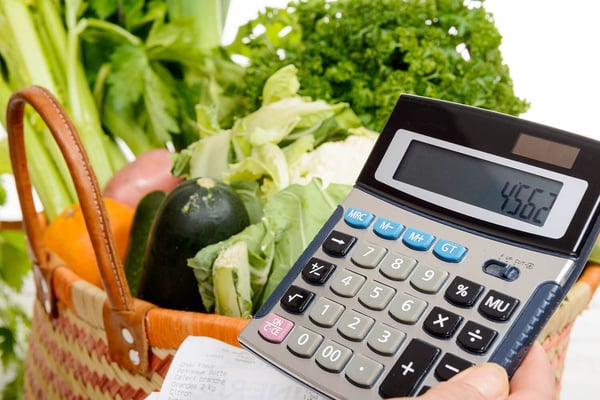Wish you had a little extra money at the end of each month? Just can’t figure out where it all goes? If you sit down and actually calculate how much money your family spends on food, it can be startling.
One of the major ways you can get your family on track with your finances is to become disciplined with your food expenses. This is even more important now during these uncertain times.
You can do this while still maintaining a healthy diet for you and your family. There are several steps to help keep you financially on track while staying well fed.

1. Control supermarket spending
Chelsea Brierton of the Simple Dollar recently published "The Simple Guide to Healthy Living on a Budget in 2020." It's a great tool to help you prioritize your health while still watching your budget.
"There are many strategies for making nutrition and fitness more affordable. Many of these strategies boil down to having a plan, doing your research, and making small lifestyle changes that can have a big impact down the line," says Brierton.
The author guides readers in learning how to eat healthier on the cheap by:
- Planning your meals in advance
- Buy (and prep) in bulk
- Shop smarter
- Make healthy substitutions
- Keep a food journal
- Get professional help
- Go meatless
Dave Ramsey gives excellent advice on his site about how to keep your bill down at the grocery store. In the article, he also talks about how you can save money without using coupons, but they can be a tool in saving you money. The important key with coupons is to only use them on products you already plan to buy. Don't allow coupons to influence you to buy impulse items just because you can save a few cents. If you become savvy with your coupons you will incorporate manufacturer and store coupons, doubling your savings.
2. Make less trips to the store
We’ve just addressed saving money while shopping at the supermarket, but another step to that is controlling how often you go to the store. Let’s face it, the more often you go to the store the more those impulse items creep in the cart. Learning to go a couple extra days and eat what you have will stretch your grocery budget.
For instance, if you normally go to the store once a week, try going three times a month instead. You will shop for 10 days at a time instead of seven, but less trips saves you money. Now that you are going to the store less often how do you survive those last couple days? You eat what you have! Here’s how you do it...
3. Eat what you have
When you don’t over-shop, you assure that you use up items you have before buying new ones. This encourages you to finish up your fresh produce. Most produce, if stored correctly, will last 10 days.
By keeping staples on hand like rice, lentils, frozen veggies, and seasoning, you can make a base for any meal. From there you can get creative in making meals based on what you have. If you need help putting meals together with what you already have on hand there are numerous websites that do just that. Most are as simple as inputting your ingredients, then recipes pop up for you to choose from. There are even handy apps that manage this for you on-the-go like Ingredient Matcher.

4. Do the work yourself
The more work that goes into pre-assembling a meal, the more you will pay. It can be alluring to walk by the meat or fish market and select the prearranged packages including your cut up veggies and seasoning all in one neat bundle, but you pay for that.
If you like what they have put together, use the idea, but do the work yourself to save money. In addition, every time the butcher cuts your chicken into parts, you pay for it. Consider buying a whole chicken and do your own chopping and skinning. Use that chicken carcass to make stock for a future meal. A few extra steps will be worth it when there is extra money in your pocket at the end of the month.
5. You can save money eating out too
Let’s keep it real: eating out will cost you more money than eating at home. The Wall Street Journal found that most restaurants charge four times as much as the actual ingredients cost them. Yet, eating out can be a great time of fellowship and celebration.
While watching your food budget, be conservative with how often you go out. In addition, be selective with what restaurants you choose. Most have menus online allowing you to predetermine if the prices match your budget. Beverages add up quickly when out; order water and watch how much your bill goes down. Don’t always jump for the pasta dish just because it is the cheapest; it’s inexpensive for you to make at home as well. Although it has the lowest price, it likely has the biggest markup.
Order something you may not have at home and just split it or bring the leftovers home for a second meal. Finally, take any discounts that are available. Signing up on restaurant websites often gives you routine coupons and birthday freebies. In addition, coupons can be found in your local paper or online sites/apps like Groupon.
Conclusion
God desires that we feed both our bodies and souls, and that we do it all to honor Him. It can be so easy to follow our flesh when it comes to food. A little discipline in this area can free up financial stress in other areas.












Comments